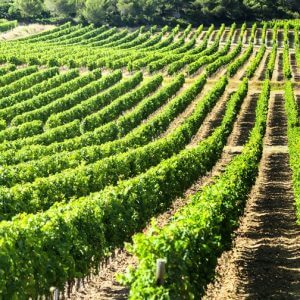Montpellier
- Home
- Montpellier
Information
Discover Montpellier
Cafe culture is alive in Montpellier, with quite a few establishments serving coffee of the highest quality. Brunch is very much a thing, and finding a suitable location in the vicinity should not present much difficulty.
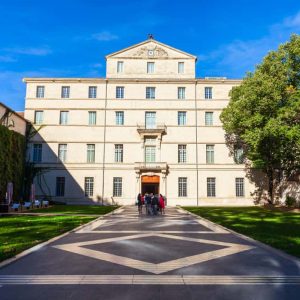
Fabre Museum
Artists from around Montpellier have helped turn the Fabre Museum into a tremendous art attraction, starting with François-Xavier Fabre, whose donation in the 1820s led to its foundation. Since then the collection has swollen to more than 800 works, donated by names like Frédéric Bazille later that century, and Pierre Soulages more recently. The museum’s paintings and sculptures are displayed in chronological order, and there’s lots of baroque art to savour: Rubens, Veronese, Rigaud and Zurbarán are all here. The 19th century is well-represented too, with Renoir, Courbet and, as you’d expect, four works by Bazille.
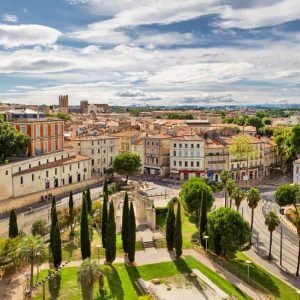
L’ Écusson (Old Montpellier)
From the Promenade de Peyrou in the west to the Place de la Comédie in the east, Montpellier has an irregular maze of fresh, shaded streets (handy in a city where there are 300 sunny days a year) that have followed the same pattern for hundreds of years. Most of the apartment buildings and houses are historic, dating from the 1600s and 1700s, and if you can see past the sturdy wooden doors, many of these residences have internal courtyards. Les Halles Castellane is Montpellier’s superb covered market, and the streets and squares around it are flooded with restaurant tables in summer, giving the centre a joyful and sociable atmosphere.
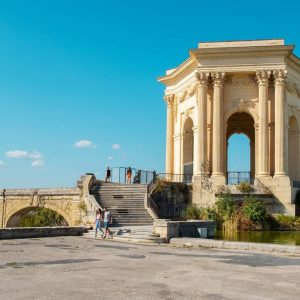
Promenade de Peyrou
At the highest part of Montpellier and just west of the old walls, this square was designed during the reign of Louis XIV, although because of a period of unrest at the start of the 18th century it wasn’t completed until the middle of the 1700s. There are lots of interesting details, like the statue of Louis XIV, which is from 1828, replacing an earlier version that had been melted down to make cannons. It shows him on horseback extending his arm towards Spain. The 18th-century Château d’Eau is a monumental water tower fed by the Saint-Clement Aqueduct, which is 14 kilometres long and crosses the square. On Sundays there’s a flea market beneath the arches of the aqueduct, which is modelled on the legendary Pont du Gard.
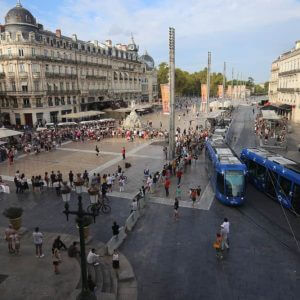
Place de la Comédie
The eastern link between Old Montpellier and the newer city districts beyond the old walls, the large Place de la Comédie has a lively ambience for its many bars, restaurants and shops. The Three Graces fountain in the middle was built in 1790, and shows the Charites from Greek mythology, which are an emblem for Montpellier. After a restorative coffee, continue your tour along the leafy walkways of the Esplanade Charles-de-Gaulle, fringing the square to the north. At night the restaurants and the imposing neoclassical buildings around the Place de la Comédie, like the Opéra national are illuminated with deep blue lights, creating a strange effect, like something out of Blade Runner!
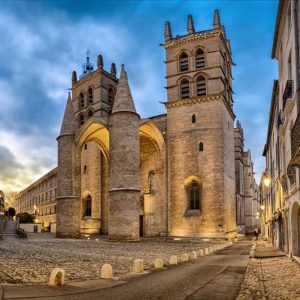
Montpellier Cathedral
The French Wars of Religion in the 16th century took their toll on Montpellier’s churches, but despite sustaining damage the gothic Cathédrale de Saint-Pierre survived. It hasn’t actually always been a cathedral either, as it started out as a monastery chapel until the diocese of Maguelone was switched to Montpellier during the reign of Francis I in the mid-1500s. The cathedral may catch you by surprise as it’s hidden among the nest of streets in the old quarter. The most arresting feature is that imposing portal with its twin pillars that are more than 4.5 metres in diameter.
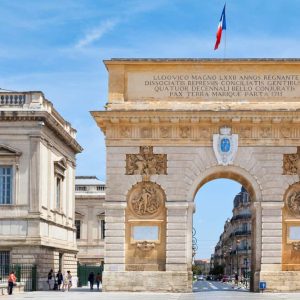
Triumphal Arch
The regal entranceway to the Promenade de Peyrou was modelled on the Porte Saint-Denis in Paris and completed in 1693. If you’re into French history, particularly the reign of the Sun King, you can take a little while to investigate the arch’s inscriptions and reliefs, telling the (one-sided!) story of the main events in his reign. There’s the Capture of Namur from the Nine Years’ War, with a figure representing the Netherlands bowing in deference to the king. You can also see a relief showing the constriction of the Canal des Deux Mers, a colossal engineering project that connected the Bay of Biscay with the Mediterranean during the 1600s.
Pavillon Populaire
In a distinguished spot on the Esplanade Charles de Gaulle is a beautiful art nouveau building built at the end of the 19th century. For more than a hundred years it’s been the site of all sorts of public exhibitions, but in the 90s it became devoted solely to fantastic temporary exhibitions of photography, put on for free. There are three exhibitions a year, showing the most celebrated 20th-century photographers like Brassaï, Bernard Plossu or Jakob Tuggener. So whenever you come to Montpellier there will be something different for you if you’ve got an eye for the art form.
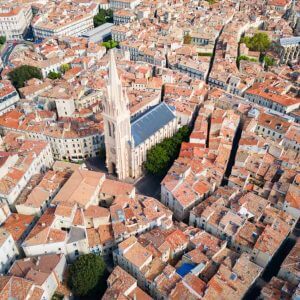
Montpellier’s Hôtels
One of the things that gives Montpellier’s old centre its class is a profusion of hôtels, extravagant 17th and 18th-century mansions. Most are from when Montpellier was the capital of Languedoc during Louis XIV’s reign, and were built for members of his court and government. There are 13 mansions in all, and you can get hold of a full itinerary from the tourist office. Among the standouts are the Hôtel des Trésoriers de France, which is from the 15th century but has an extravagant facade added in 1675, and Hôtel de St-Côme, which contains an anatomical theatre built with funds donated by François Gigot de la Peyronie, the Royal Surgeon for Louis XV.

Montpellier Zoological Park
Henri de Lunaret, who owned the Hôtel des Trésoriers, also possessed the historic estate where Montpellier’s zoo is set, and he bequeathed the land to the city on the condition that it should have a charitable purpose. The zoo has been around since 1964 and is bordered by a nature reserve on the rugged banks of the Lez River. There are more than 750 animals at the zoo, from 140 species including giraffes, white rhinos, cheetahs and Syrian brown bears. Enclosures are in six different “biozones”, synthesising habitats from around the world. For the littlest visitors there’s an educational farm with tame goats and sheep to feed.
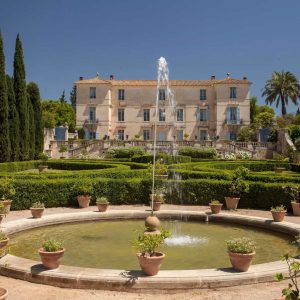
Château de Flaugergues
Just in the eastern suburbs of the city is a glorious estate , built as a “folly”, one of several summer residences around Montpellier for 17th and 18th-century aristocracy. Flaugergues was established in the late-1600s and today has been enveloped by the city, sitting incongruously in a modern district of warehouses and commercial estates. Take a turn around the neatly-trimmed gardens and go inside to see the exquisite interiors with paintings, historic furniture and five Flemish tapestries from the 1670s portraying the life of Moses. There’s also a 30-hectare vineyards on the estate, belonging to the Côteaux du Languedoc region, and the Château holds a tasting session as part of a tour.

Aquarium Mare Nostrum
On a rare rainy day you can easily spend a couple of hours at Montpellier’s aquarium, which is about to mark its first decade and has 400 marine and freshwater species in tanks totalling almost three million litres. The headline is the central pool, 10 by 18 metres, the largest in France. As for creatures, you’ve got penguins from South Africa, a large range of sharks and rays, plus a touch pool where little ones can find out what a starfish’s back feels like. The tour also leads you through recreated tropical rainforest, with monkeys, iguanas and tanks containing piranhas.
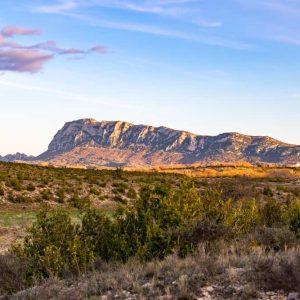
Pic Saint-Loup
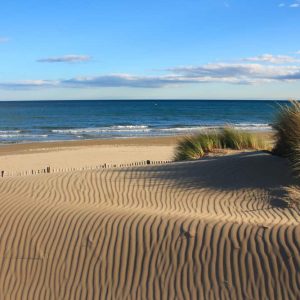
Beach Trips
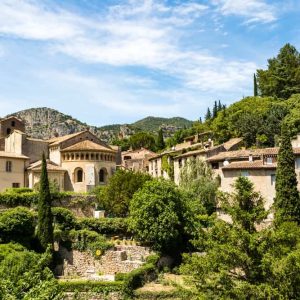
Saint-Guilhem-le-Désert
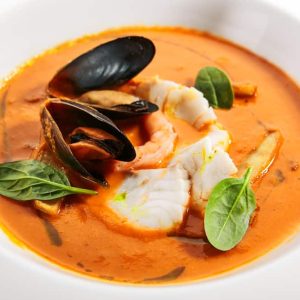
Food and Drink
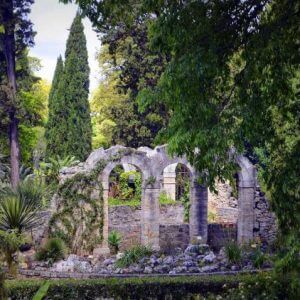
Jardin des Plantes
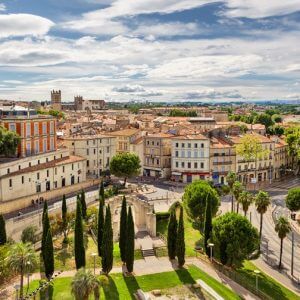
Do & See
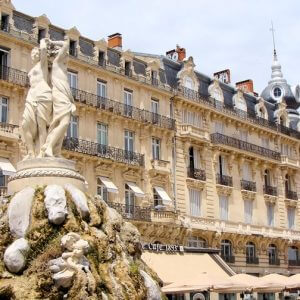
The City
